|
BACKGROUND
1. WHAT IS AN ALLEGORY?
2. TYPES IN SCRIPTURE
3. LIFE IN THE TIME OF RUTH
4. THE JEWISH SOCIAL WELFARE SYSTEM
5. A KINSMAN-REDEEMER
.......THE KINSMAN-REDEEEMERS OBLIGATIONS
6. WHEAT AND BARLEY
.......BARLEY
.......WHEAT
.......THE HARVEST
.......THRESHING AND WINNOWING
The
full background to this teaching is available online at this link
Book of Ruth Background
|
Online links to scriptures (New International Version [NIV] unless otherwise stated) are shown in blue
| THE PRINCIPAL CHARACTERS |
|
To understand today's application of this amazing 'story' we must appreciate who or what each of the principal characters represents. So it is here we need to start.
|
| BOAZ: A type of Jesus. |
|
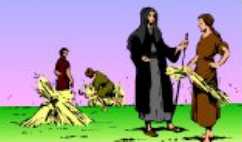 His name means, 'in him is strength'. Boaz was the 'Kinsman Redeemer' (restorer) of Naomi and Ruth. Jesus is our redeemer. His name means, 'in him is strength'. Boaz was the 'Kinsman Redeemer' (restorer) of Naomi and Ruth. Jesus is our redeemer.
Interestingly, the two pillars at the front of Solomon's Temple were named Jachin; 'He will establish' and Boaz; 'In Him there is strength.' Here we have the perfect picture of Jesus upon His return to reign in authority and power.
However He first came in weakness, as symbolized by the Tabernacle of Moses A perfect picture of us, today's believers, walking in the weakness of imperfection through the wilderness with Christ, as did the children of Israel so long ago. But He also overcame sin and death on the Calvary's cruel Cross, which we celebrate today, as typified by David's Tabernacle. While finally, the glory of the Temple pictures Christ's millennial reign! It was this final kingly reign that both the Jews, and many unbelievers today, expected Jesus to institute when He first came! The concept of a servant king to be imitated had and has much less appeal!
Galatians 3:13-14
|
| NAOMI: Type of the Jewish people and then the "Jewish church" |
|
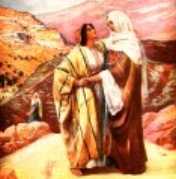 Naomi is a classic picture of a Jewish matriarch who, typical of women generally, is the power behind her husband's throne. But tragically, her husband, Elimelech (Meaning ' My God is King') dies. With extreme difficulty in the culture of the time, Naomi had to assume headship of the family. When things didn't go well, she cried out for her name to be changed from Naomi (my pleasantness) to Mara (bitter). But once the opportunity arises, her life quickly becomes focused on rectifying this situation through her daughter-in-law, Ruth. Naomi is a classic picture of a Jewish matriarch who, typical of women generally, is the power behind her husband's throne. But tragically, her husband, Elimelech (Meaning ' My God is King') dies. With extreme difficulty in the culture of the time, Naomi had to assume headship of the family. When things didn't go well, she cried out for her name to be changed from Naomi (my pleasantness) to Mara (bitter). But once the opportunity arises, her life quickly becomes focused on rectifying this situation through her daughter-in-law, Ruth.
|
|
|
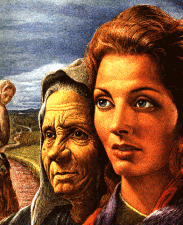 Ruth was a foreigner, from the land of Moab, (today's central Jordan) who was married to one of Naomi's two sons, Mahlon (puny, sick) or Chilion (pining, failing). Moab had a long history of conflict with the Jews, going back to the time when the Moabite King refused to let the Israelites pass through his land, shortly after their escape from a 400 year captivity in Egypt. This antagonism and conflict continued and intensified throughout the centuries that followed. Ruth, being a Moabitess was as 'unjewish' and as low as you could go in the Jewish societal structure of the day. So for her to return to Israel with her mother-in-law after the death of both their husbands, was a huge act of self-sacrifice. Ruth was a foreigner, from the land of Moab, (today's central Jordan) who was married to one of Naomi's two sons, Mahlon (puny, sick) or Chilion (pining, failing). Moab had a long history of conflict with the Jews, going back to the time when the Moabite King refused to let the Israelites pass through his land, shortly after their escape from a 400 year captivity in Egypt. This antagonism and conflict continued and intensified throughout the centuries that followed. Ruth, being a Moabitess was as 'unjewish' and as low as you could go in the Jewish societal structure of the day. So for her to return to Israel with her mother-in-law after the death of both their husbands, was a huge act of self-sacrifice.
|
| ORPAH: Type of the end time church that falls away. |
|
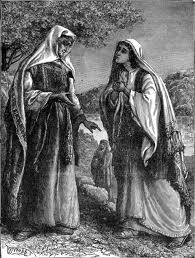 Orpah (back of the-neck, mane, stubborn) married Naomi's other son during the time the family spent in Moab, while escaping the drought in Israel. Orpah started on the journey back to Israel, but on the advice of Naomi, took the easy (and seemingly sensible!) option of returning to her family and remaining in Moab, in itself a type of 'the world'. Orpah (back of the-neck, mane, stubborn) married Naomi's other son during the time the family spent in Moab, while escaping the drought in Israel. Orpah started on the journey back to Israel, but on the advice of Naomi, took the easy (and seemingly sensible!) option of returning to her family and remaining in Moab, in itself a type of 'the world'.
|
| TO THE JEWS |
|
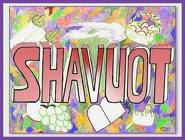 The story represents a picture of the transformation of Naomi from despair to happiness and cultural fulfilment, through the selfless acts of Boaz and Ruth. The story represents a picture of the transformation of Naomi from despair to happiness and cultural fulfilment, through the selfless acts of Boaz and Ruth.
This is well expressed in a Jewish description of the traditional reading of Ruth on the Feast of Shavout, or Pentecost, as Christians know it.
"Reading of the Book of Ruth: On the morning of Shavuot, we read the Book of Ruth, one of the "five scrolls". The book is the story of Ruth, a Moabite who chose to convert to Judaism, and was the great-grandmother of King David. There are many reasons for this custom. One has to do with the main character of the book, Ruth. Ruth was a convert, meaning she took upon herself the yoke of Jewish law. So too on Shavuot, as we celebrate the giving of the Law, we take upon ourselves a new the yoke of the Torah." (http://www.geeboosh.com/shavuot.htm)
|
| TO CHRISTIANS |
|
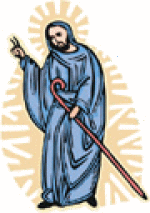 A picture of Jesus (Boaz) and His care for His end time combined Gentile (Ruth) and Jewish (Naomi) Church. A picture of Jesus (Boaz) and His care for His end time combined Gentile (Ruth) and Jewish (Naomi) Church.
This amazing truth is revealed in a simple story, ironically in one of only two books in the Bible that has no mention of God. A story that took place nearly 3,000 years ago. A family tragedy, ending in a family restoration. Yet, this seemingly simple story contains Kingdom truths revealing God's plan for His church in these end times.
Let's look closer, shall we?
|
| UNDERLYING SPIRITUAL MEANING:
A PICTURE OF THE END TIME CHURCH |
|
|
| 1:1-1:5 DEPARTURE AND CONSEQUENCES |
|
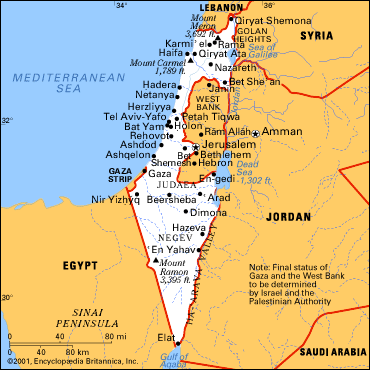 The family (representing Israel) deserted God by leaving Israel for Moab, to escape a severe famine affecting Israel. Once settled there, in a stay lasting more than 10 years, they compounded their disobedience by intermarrying. The men paid the ultimate price for disobeying God's instructions - premature death. The women too suffered, for they had no surviving offspring - a matter of cultural shame to the Jews and most likely, the Moabites too. The family (representing Israel) deserted God by leaving Israel for Moab, to escape a severe famine affecting Israel. Once settled there, in a stay lasting more than 10 years, they compounded their disobedience by intermarrying. The men paid the ultimate price for disobeying God's instructions - premature death. The women too suffered, for they had no surviving offspring - a matter of cultural shame to the Jews and most likely, the Moabites too.
This disobedience is symbolic of the Jewish nation rejecting Jesus.
Ruth 1:1-5
|
| 1:6-1:7 RETURN TO ISRAEL |
|
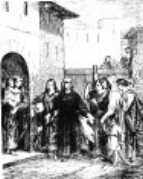 Naomi returning to Bethlehem Naomi returning to Bethlehem
The Lord rescued His people from the famine, so Naomi (Israel) ran back home.
Symbolic of the Jews returning to Israel, where the formation of the first Jewish State in 2000 years was declared on 14 May 1948.
Ruth 1:6-7
|
| 1:8-1:15 THE CHOICE |
|
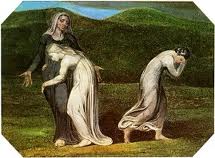 Orpah and Ruth (together the gentile church) set out to go back to Israel with Naomi. On the way however, Naomi explained to them the harsh reality their future with her in a foreign land and gave them the opportunity to change their minds and return to their people. Realizing how tough things would be, Orpah decided to remain within Moab, thus avoiding the shame of having no husband, being disliked by the Jews, having to rely on charity, etc. Orpah and Ruth (together the gentile church) set out to go back to Israel with Naomi. On the way however, Naomi explained to them the harsh reality their future with her in a foreign land and gave them the opportunity to change their minds and return to their people. Realizing how tough things would be, Orpah decided to remain within Moab, thus avoiding the shame of having no husband, being disliked by the Jews, having to rely on charity, etc.
Symbolic of the partial falling away of the church as end times approach and things get tough. It doesn't necessarily mean that all will leave the church entirely, but many will follow a form of 'religion' based on acceptable worldly (Moab) principles.
Ruth 1:8-15
|
| 1:16-1:19 THE COMMITMENT |
|
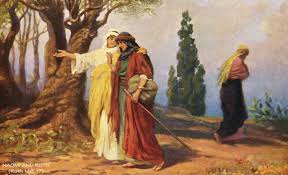 Ruth stuck by her principles and marriage commitment by going back with Naomi, fully realizing the difficulties and humiliation she would face. Their return caused a stir in the town. Ruth stuck by her principles and marriage commitment by going back with Naomi, fully realizing the difficulties and humiliation she would face. Their return caused a stir in the town.
Symbolic of the remaining (end time) church's full commitment, putting the world (Moab) aside and going on in God's will.
Ruth 1:16-19
|
| 1:20-1:22 IMPACT BY EXAMPLE |
|
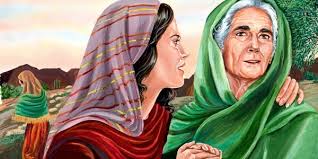 The people themselves can now see the contrast between a desperate Naomi (Israel) and a faithful Ruth (end time church). The people themselves can now see the contrast between a desperate Naomi (Israel) and a faithful Ruth (end time church).
The end time church sets the example to Israel and has an impact upon her.
Ruth 1:20-22
|
| <i>NEXT WEEK:</i>
A REVELATION OF��.THE BOOK OF RUTH continues |
|
 With a call to harvest and the promise of a bountiful reward, as found in Chapter 2. With a call to harvest and the promise of a bountiful reward, as found in Chapter 2.
|
| A NOTE FROM DAVID |
|
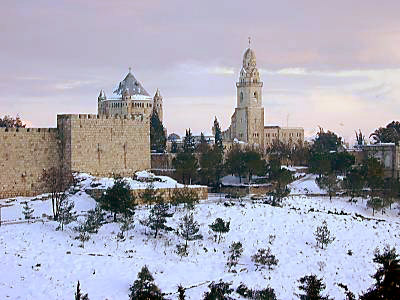 Allegories are a powerful way of getting a message across to people. For example, John Bunyan's 'Pilgims Progress' has been one of the most popular books of all time. So it is no wonder that God used this method too! Allegories are a powerful way of getting a message across to people. For example, John Bunyan's 'Pilgims Progress' has been one of the most popular books of all time. So it is no wonder that God used this method too!
I trust you will join me next week as we go through the 2nd chapter and see how the story develops and learn more about its important application to us today.
IMAGES AND ART: Jerusalem
Mt. Zion
Also known as Mount Sion, the Upper City, the Southwestern Hill
Dormitian Abbey
Crowning the summit of the modern Mt. Zion is Dormitian Abbey. Commemorating the rest that Mary entered into, this complex was constructed by Kaiser Wilhelm II beginning in 1900. The church was built in response to a request to have a German Catholic church in the city following the Kaiser's support for the construction of the Lutheran Church of the Redeemer in 1898.
|
So until next week.......
MAY GOD BLESS YOU AND YOU BLESS GOD!
His servant and yours
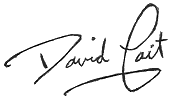
Learn more about us at...
www.wwj.org.nz/about.php
|
A DAVID'S DOODLING
Gods hopefulness gives the hopeless, hope.
David Tait
|
Check
out the WWJ website for….
More David's Doodlings: www.wwj.org.nz/dd.php
Waxing Lyrical: http://www.wwj.org.nz/waxing.php
If Only I'd Thought of it: http://www.wwj.org.nz/thought.php
Laughing at Ourselves: http://www.wwj.org.nz/laugh.php
A look at some of lifes curious questions: http://www.wwj.org.nz/why.php
|

 His name means, 'in him is strength'. Boaz was the 'Kinsman Redeemer' (restorer) of Naomi and Ruth. Jesus is our redeemer.
His name means, 'in him is strength'. Boaz was the 'Kinsman Redeemer' (restorer) of Naomi and Ruth. Jesus is our redeemer. Naomi is a classic picture of a Jewish matriarch who, typical of women generally, is the power behind her husband's throne. But tragically, her husband, Elimelech (Meaning ' My God is King') dies. With extreme difficulty in the culture of the time, Naomi had to assume headship of the family. When things didn't go well, she cried out for her name to be changed from Naomi (my pleasantness) to Mara (bitter). But once the opportunity arises, her life quickly becomes focused on rectifying this situation through her daughter-in-law, Ruth.
Naomi is a classic picture of a Jewish matriarch who, typical of women generally, is the power behind her husband's throne. But tragically, her husband, Elimelech (Meaning ' My God is King') dies. With extreme difficulty in the culture of the time, Naomi had to assume headship of the family. When things didn't go well, she cried out for her name to be changed from Naomi (my pleasantness) to Mara (bitter). But once the opportunity arises, her life quickly becomes focused on rectifying this situation through her daughter-in-law, Ruth.  Ruth was a foreigner, from the land of Moab, (today's central Jordan) who was married to one of Naomi's two sons, Mahlon (puny, sick) or Chilion (pining, failing). Moab had a long history of conflict with the Jews, going back to the time when the Moabite King refused to let the Israelites pass through his land, shortly after their escape from a 400 year captivity in Egypt. This antagonism and conflict continued and intensified throughout the centuries that followed. Ruth, being a Moabitess was as 'unjewish' and as low as you could go in the Jewish societal structure of the day. So for her to return to Israel with her mother-in-law after the death of both their husbands, was a huge act of self-sacrifice.
Ruth was a foreigner, from the land of Moab, (today's central Jordan) who was married to one of Naomi's two sons, Mahlon (puny, sick) or Chilion (pining, failing). Moab had a long history of conflict with the Jews, going back to the time when the Moabite King refused to let the Israelites pass through his land, shortly after their escape from a 400 year captivity in Egypt. This antagonism and conflict continued and intensified throughout the centuries that followed. Ruth, being a Moabitess was as 'unjewish' and as low as you could go in the Jewish societal structure of the day. So for her to return to Israel with her mother-in-law after the death of both their husbands, was a huge act of self-sacrifice.  Orpah (back of the-neck, mane, stubborn) married Naomi's other son during the time the family spent in Moab, while escaping the drought in Israel. Orpah started on the journey back to Israel, but on the advice of Naomi, took the easy (and seemingly sensible!) option of returning to her family and remaining in Moab, in itself a type of 'the world'.
Orpah (back of the-neck, mane, stubborn) married Naomi's other son during the time the family spent in Moab, while escaping the drought in Israel. Orpah started on the journey back to Israel, but on the advice of Naomi, took the easy (and seemingly sensible!) option of returning to her family and remaining in Moab, in itself a type of 'the world'.  The story represents a picture of the transformation of Naomi from despair to happiness and cultural fulfilment, through the selfless acts of Boaz and Ruth.
The story represents a picture of the transformation of Naomi from despair to happiness and cultural fulfilment, through the selfless acts of Boaz and Ruth.  A picture of Jesus (Boaz) and His care for His end time combined Gentile (Ruth) and Jewish (Naomi) Church.
A picture of Jesus (Boaz) and His care for His end time combined Gentile (Ruth) and Jewish (Naomi) Church.  The family (representing Israel) deserted God by leaving Israel for Moab, to escape a severe famine affecting Israel. Once settled there, in a stay lasting more than 10 years, they compounded their disobedience by intermarrying. The men paid the ultimate price for disobeying God's instructions - premature death. The women too suffered, for they had no surviving offspring - a matter of cultural shame to the Jews and most likely, the Moabites too.
The family (representing Israel) deserted God by leaving Israel for Moab, to escape a severe famine affecting Israel. Once settled there, in a stay lasting more than 10 years, they compounded their disobedience by intermarrying. The men paid the ultimate price for disobeying God's instructions - premature death. The women too suffered, for they had no surviving offspring - a matter of cultural shame to the Jews and most likely, the Moabites too.  Naomi returning to Bethlehem
Naomi returning to Bethlehem Orpah and Ruth (together the gentile church) set out to go back to Israel with Naomi. On the way however, Naomi explained to them the harsh reality their future with her in a foreign land and gave them the opportunity to change their minds and return to their people. Realizing how tough things would be, Orpah decided to remain within Moab, thus avoiding the shame of having no husband, being disliked by the Jews, having to rely on charity, etc.
Orpah and Ruth (together the gentile church) set out to go back to Israel with Naomi. On the way however, Naomi explained to them the harsh reality their future with her in a foreign land and gave them the opportunity to change their minds and return to their people. Realizing how tough things would be, Orpah decided to remain within Moab, thus avoiding the shame of having no husband, being disliked by the Jews, having to rely on charity, etc. Ruth stuck by her principles and marriage commitment by going back with Naomi, fully realizing the difficulties and humiliation she would face. Their return caused a stir in the town.
Ruth stuck by her principles and marriage commitment by going back with Naomi, fully realizing the difficulties and humiliation she would face. Their return caused a stir in the town. The people themselves can now see the contrast between a desperate Naomi (Israel) and a faithful Ruth (end time church).
The people themselves can now see the contrast between a desperate Naomi (Israel) and a faithful Ruth (end time church). With a call to harvest and the promise of a bountiful reward, as found in Chapter 2.
With a call to harvest and the promise of a bountiful reward, as found in Chapter 2.  Allegories are a powerful way of getting a message across to people. For example, John Bunyan's 'Pilgims Progress' has been one of the most popular books of all time. So it is no wonder that God used this method too!
Allegories are a powerful way of getting a message across to people. For example, John Bunyan's 'Pilgims Progress' has been one of the most popular books of all time. So it is no wonder that God used this method too!